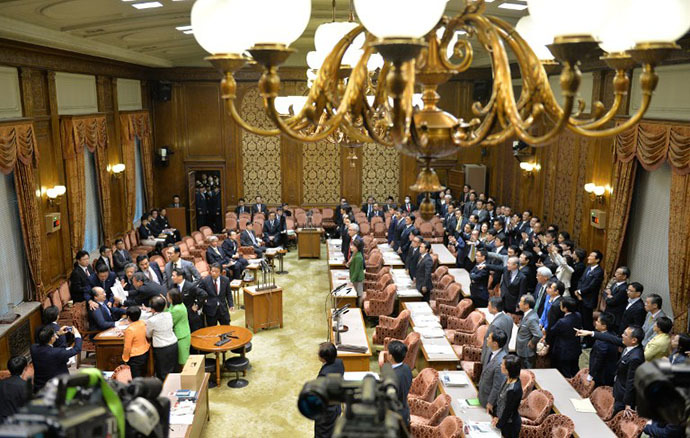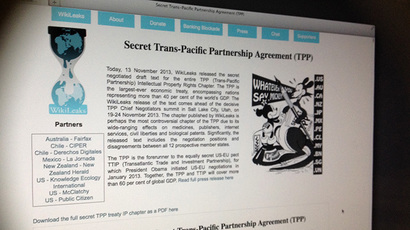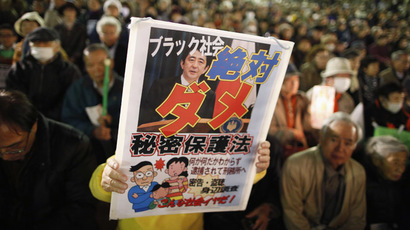Japan parliament panel overrules protest to pass divisive state secrets bill

Japanese PM Shinzo Abe’s Liberal Democratic Party successfully forced a controversial new state secrets bill through the National Security Committee of the upper house of parliament Thursday, in the face of widespread opposition and protests.
The chairman of the House of Councilors’ committee called for a vote on the bill, prompting opposition legislators to surround him, shouting, while ruling bloc lawmakers ensured its passage.
“The committee chairman did not even mention that they will vote on it when we had a meeting before the session,” Tetsuro Fukuyama, a committee member from the opposition Democratic Party of Japan, told the Japan Times. “They again leveraged on the power of numbers. I am beyond angry,” he said.
The bill will effectively prevent media accessing state information classed as sensitive by imposing sentences of up to 10 years in prison on state officials if they are found to have leaked to the press.
It was railroaded through the lower House of Representatives in Japan’s parliament, the National Diet, within the last two weeks, despite thousands of people taking to Tokyo’s streets days beforehand to protest its draconian provisions.
Opposition members of the committee repeatedly called for Abe’s ruling coalition not to repeat the same forceful, steamroller tactics which had been used in November, which prompted them to criticize it, saying that bill had not undergone enough deliberation.
The ruling coalition defended the bill’s passage.
“The [lower house] committee spent 22 hours in questioning the government, while the upper house spent 17 hours, or 76 percent of the time . . . I think we did enough,” Masahisa Sato, an LDP member of the House of Councilors committee, told the paper. It is traditional that the House of Councilors spends 70 percent of the time deliberating a bill that was introduced in the House of Representatives. However, the time the bill spent in the lower house was itself criticized.

Opposition MPs from the Democratic Party of Japan, Japan Restoration Party, Japanese Communist Party and People's Life Party complained that insufficient debate had been conducted prior to the vote.
The move will apparently prevent media accessing information in four sensitive areas: defense, diplomacy, counter-terrorism and counter-espionage.
The information will be further divided into 23 types. Top officials from all departments would have the power to declare issues “secret”. The “secrets” could then be kept classified for up to 60 years.
People who are not state officials, such as journalists and private sector employees, could also receive up to five years’ imprisonment if they are found to be using “grossly inappropriate” means to acquire information.
“The right to know has now officially been superseded by the right of the government to make sure you don’t know what they don’t want you to know,” said journalist Jake Adelstein, of the Japan Times.
The new proposal declared that a “highly independent body” would oversee the classification and declassification of state “secrets.” However, the ruling bloc failed to upgrade the body to having the status of a highly independent group similar to that of the country’s Fair Trade Commission by mandating it unequivocally through guaranteeing its independence in the bill.
“Responses from the government do not guarantee that the government will set up such an oversight body, unless it’s written in the law,” said Mizuho Fukushima, former leader of the Democratic Party of Japan. “That’s why we need to scrap the bill.”
PM Shinzo Abe has argued that the bill is necessary to plug what he labels a leaky government machine, which he says prevents the US sharing intelligence with Japan. However, critics say the bill is so vague and broad that information that is merely embarrassing for the authorities could go unreported.














